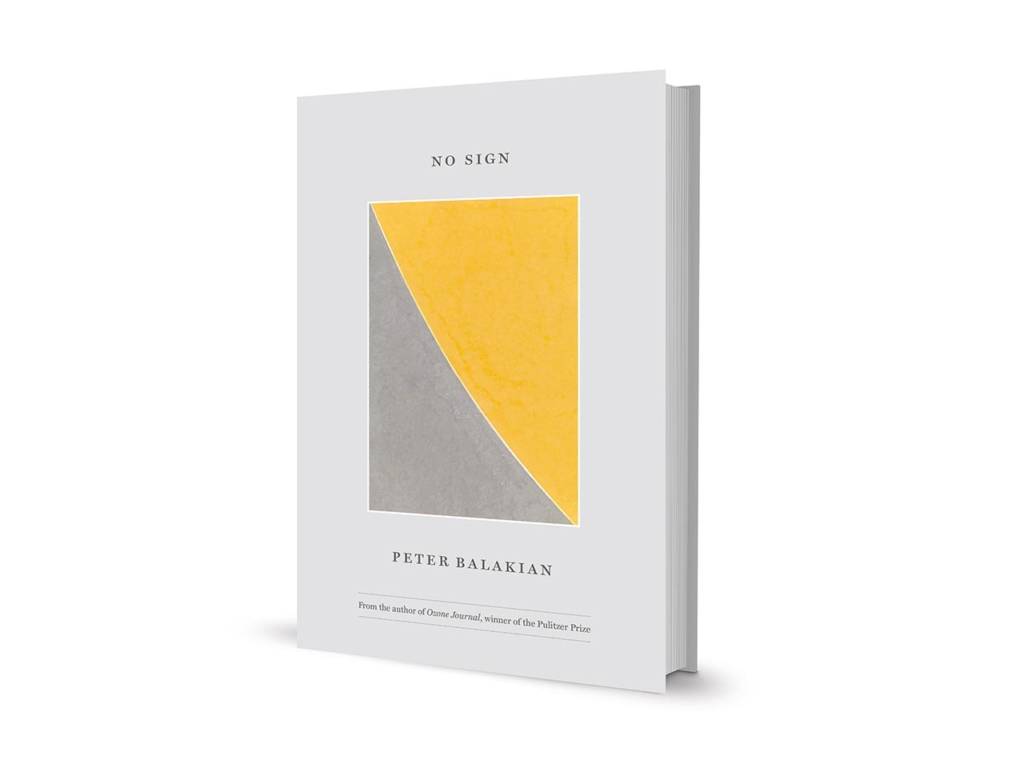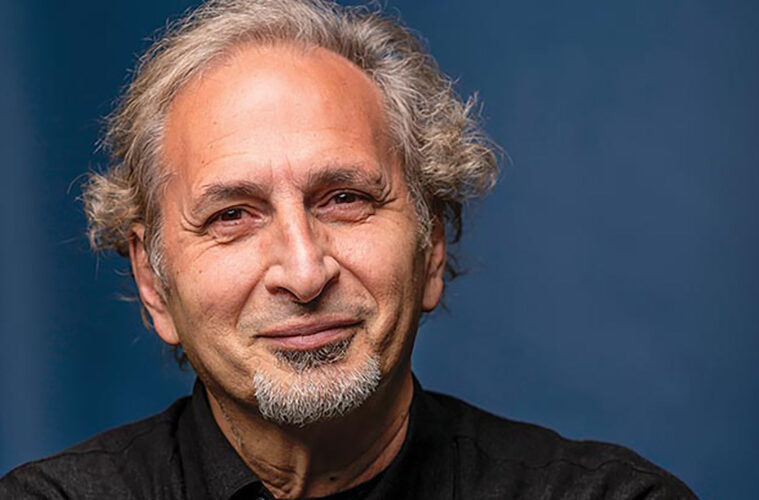Professor Peter Balakian has centered his new release, No Sign (University of Chicago Press, 2022), around a multi-sectional long poem — the kind that defined his last book, Ozone Journal, which won the 2016 Pulizer Prize for Poetry.
The titular poem is the third segment following the previously published “A-Train/Ziggurat/Elegy” (Ziggurat, 2010) and “Ozone Journal” (Ozone Journal, 2015).
“All chart the evolution of one character or persona whose experiences evolve from the mid-1970s to the present in and around New York City,” explains the Donald M. and Constance H. Rebar Professor in humanities, professor of English, and director of creative writing.

In a nonlinear form, the poem “No Sign” takes readers through time and place, addressing topics such as the future of the planet, the tragedy of Hiroshima at the start of the nuclear age, and the Vietnam War.
“Poetry, in particular, has a great capacity to absorb history, and to make historical memory a dynamic contemporary force,” he told the New York Times.
The following poem, “History, Bitterness,” probes trauma, history, and memory, all wrapped around a moment Balakian had by phone with writer James Baldwin many years ago as Baldwin was dying.
Although Balakian’s poems focus on stark realities, “We always see daylight through the kitchen window near dusk,” as he writes in “No Sign.” Or, as one reviewer remarks: “Balakian is able to praise the world though he knows its ‘bitter history.’”
Balakian, who has taught at Colgate since 1980, is the author of many books, including the New York Times best-seller The Burning Tigris: The Armenian Genocide and America’s Response and the memoir Black Dog of Fate, winner of the PEN/Martha Albrand Prize.
History, Bitterness
A phone booth August/ Yaddo/ Saratoga Springs—air
of the Tiffany parlor—sour scent of empty wine bottles,
my friend handed me the sweating receiver: “Go ahead
say hello.”
What could I say to James Baldwin who was dying in the
south of France?
No name in the street. Paris. Algiers. Little Rock, you can
fill it in . . .
I’m sitting at Les Deux Magots with my NY Yankees
umbrella in my lap,
a wide glass of wine from some vineyard of Burgundy in
my hand,
recalling that Baldwin sat here drinking scotch all day
and writing
as friends dropped by. And it hits me: just over Pont de
Sully my great uncle
sat in a big treaty room in 1919 representing Armenia (did
it exist?) in a fancy
hotel with others who hoped for a nation in return
for the slaughter.
Baldwin knew Sartre and de Beauvoir, he saw Camus
pass by.
It was 1958 and the Algerian cabby who dropped him
off drunk
on the curb was half-blind from the revolution.
Bang bang bang goes the heart. Mr. Baldwin was dying in a
sensual village
in the south of France. After a week at Versailles my uncle
came to that hotel room
where in the closet of his head a big white sheet floated
over the Black Sea.
What did rape and massacre mean? Fail-proof, shattered,
bitten-off
words that floated over the bridge into the carnival horns
of night.
A few months earlier Miles Davis passed Baldwin at Les
Deux Magots
on his way to play for Louis Malle’s Ascenseur pour
l’échafaud
the spurting air of love love love slipping from the valves—
the spit and breath of night in Paris off the torpid brown
Seine where Paul Celan had disappeared not long before.
Hiss hiss hiss goes the heart. It’s 1958 and Camus still walks
the boulevard—the war in Algeria is daily acid in the river.
What are degrees of separation? Private myths? Illusions?
My aunt the surrealist might call them chance meetings.
Do we invent proximities for our need, for salvation,
for love?
Wilson, Clemenceau, Lloyd George, names my uncle
scrawled
on a map of the dispossessed—on a wall in a hotel of cards
where Dixieland horns played at a banquet for the Grande
Armée
and the next map of Europe was shuffled with an ace
in the hole.
Miles Davis spent seven hours with Louis Malle making
some
languid, piercing, hollow sliding sounds in the
indeterminate dank night;
no name on the street stalked him. A few years later
Baldwin moved just miles
from where my father was born in Istanbul—a few years
after the Armenians
were expunged from Turkey and my grandparents left the
ghost map
on the wall. It was 1919 and the flu blew along Saint-
Germain where
my grandparents met my uncle that fall. I knew Baldwin’s
heart went hollow,
languid, and sizzled with the need to get out of America; it
even led him to
the place my grandparents fled—before they landed a
couple miles from Baldwin’s
apartment in Harlem.
Are these degrees of separation? Or just my way of thinking
about that strange
moment in a phone booth at an artists’ colony in the
summer of ’86?
My friend said: “If you love Jimmy’s work, I know he’d love
to hear
from you. All good news means a lot, especially at the end.”
What could I say to Mr. Baldwin? He’d helped me
understand the bitter
history that had trapped me—that was trapped in me.
Istanbul, New York, Paris. No name. No street.
I was sweating into the phone. Mr. Baldwin’s voice was frail
but unmistakable.

